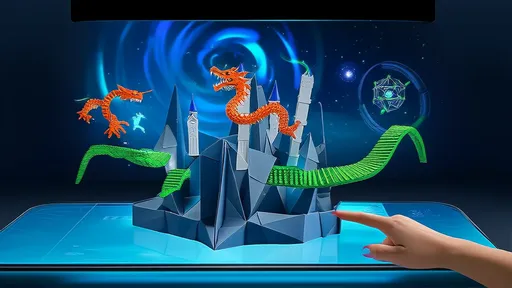In an era where digital entertainment often equates to sensory overload, a quiet revolution is brewing in the gaming world. Zen-inspired games, with their deliberate lack of traditional objectives and scorekeeping, are carving out a unique space for players seeking mindfulness rather than mastery. These unconventional experiences challenge our fundamental assumptions about what games should be—or more importantly, what they could be when unshackled from the dopamine-driven reward systems that dominate mainstream titles.
The philosophy behind these anti-games stems from Eastern meditation practices rather than Western competitive structures. Developers are creating digital sandboxes where the absence of goals becomes the ultimate freedom, allowing players to simply exist within beautifully crafted virtual spaces. Unlike traditional games that constantly evaluate performance through points or progress bars, these experiences measure success in moments of presence—the duration between checking one's phone or the number of conscious breaths taken while interacting with the environment.
What makes these games particularly fascinating is their ability to induce flow states typically associated with deep meditation. The gentle sway of grass in Proteus, the hypnotic rhythm of stacking stones in Everything, or the mesmerizing color transitions in Hue create meditative feedback loops. Players report losing track of time in ways that mirror transcendental meditation rather than the compulsive "one more level" addiction of conventional gaming. This represents not just a new genre, but potentially a new relationship between humans and interactive media.
The design challenges for such games prove unexpectedly complex. Creating engagement without objectives requires meticulous attention to sensory details—the crunch of virtual snow must feel satisfying, cloud movements should captivate without demanding attention. Developers often incorporate subtle procedural systems that respond to player presence without imposing rules. A tree might bloom when approached, or tides might follow the player's breathing pattern, creating organic connections that feel personally significant without explicit instructions.
Critics initially dismissed these experiences as "not real games," but their cultural impact continues to grow. Psychotherapists have begun experimenting with them as tools for anxiety management, while mindfulness apps incorporate interactive elements borrowed from these titles. The military has even shown interest in using similar virtual environments for PTSD treatment, recognizing their unique ability to lower stress hormones without pharmaceutical intervention.
As VR technology matures, zen gaming finds its most powerful expression. Floating through the cosmic ocean of Cosmic Flow or watching fractal landscapes evolve in Tripp demonstrates how immersive tech can amplify meditative states. The complete sensory isolation of VR headsets creates ideal conditions for digital mindfulness, removing physical world distractions more effectively than any meditation app. Early studies suggest these virtual environments may actually enhance the neurological benefits of traditional meditation practices.
The commercial success of titles like Journey and Flower proves there's substantial appetite for these experiences. What began as niche experiments now influences mainstream game design, with AAA titles incorporating "zen modes" and minimalist UI options. This cultural shift reflects broader societal trends toward digital detox and conscious technology use—players increasingly value games that leave them feeling refreshed rather than drained.
Perhaps the most radical aspect of zen gaming lies in its redefinition of player agency. Traditional games offer the illusion of choice within carefully constructed systems of rules. These new experiences offer something more profound—the freedom to simply be, to engage or disengage without judgment, to find meaning in absence. In our achievement-obsessed culture, that might be the most revolutionary gameplay mechanic of all.
The future of this genre may lie in personalized meditation environments. Imagine AI-generated landscapes that adapt to your breathing patterns and brainwave activity, or shared virtual spaces where groups meditate through abstract collaborative interactions. As biometric feedback integration improves, these games could become powerful tools for mental health, creativity enhancement, and even spiritual exploration—fulfilling gaming's often-overlooked potential as an art form that transforms rather than simply entertains.
What began as an avant-garde rebellion against gaming conventions has blossomed into something resembling a movement. From indie developers to scientific researchers, diverse groups are recognizing the value of digital experiences that prioritize being over doing. In a world where attention is the new currency, perhaps games that teach us to reclaim our focus will prove more valuable than those designed to exploit it.

By /Jul 3, 2025

By /Jul 3, 2025

By /Jul 3, 2025

By /Jul 3, 2025

By /Jul 3, 2025

By /Jul 3, 2025

By /Jul 3, 2025

By /Jul 3, 2025

By /Jul 3, 2025

By /Jul 3, 2025

By /Jul 3, 2025

By /Jul 3, 2025

By /Jul 3, 2025

By /Jul 3, 2025

By /Jul 3, 2025

By /Jul 3, 2025

By /Jul 3, 2025

By /Jul 3, 2025